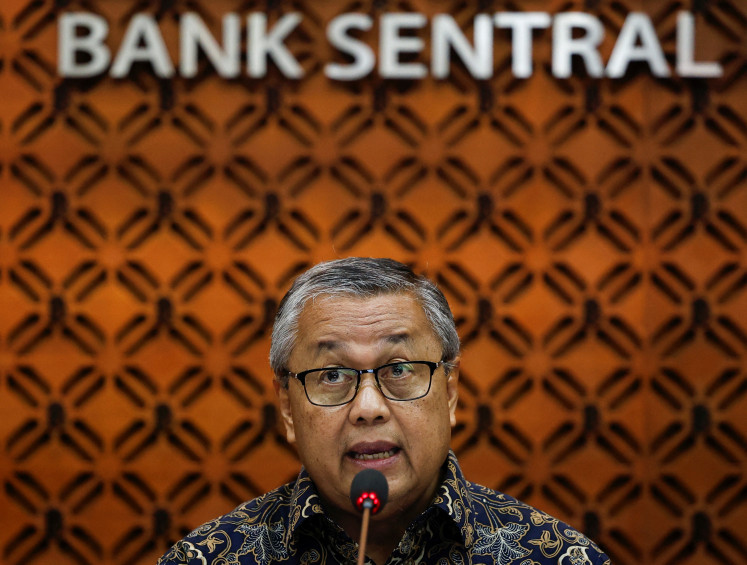Popular Reads
Top Results
Can't find what you're looking for?
View all search resultsPopular Reads
Top Results
Can't find what you're looking for?
View all search resultsPasar Baru a bastion of pluralism in Jakarta
Interfaith tour: A tour guide talks about the Jehovah’s Witness faith group in front of its Kingdom Hall church on Jl
Change text size
Gift Premium Articles
to Anyone
I
span class="caption">Interfaith tour: A tour guide talks about the Jehovah’s Witness faith group in front of its Kingdom Hall church on Jl. Kelinci Raya, Pasar Baru, Central Jakarta, during a “Walk to Understand” tour on March 25. The tour promotes interfaith understanding by taking participants to several houses of worship in and around Pasar Baru.(JP/Kharishar Kahfi)
If Jakartans are asked for an example of religious pluralism in the Muslim-majority city, they are usually quick to point their fingers at the Istiqlal mosque and the Jakarta Cathedral, which are located side by side in the heart of the city.
But merely hundreds of meters from Istiqlal and the Cathedral lies a bastion of pluralism called Pasar Baru, where places of worship for several beliefs, including those not recognized by the government, live side by side in harmony.
One of them is a Hare Krishna temple, which lies near Pasar Baru hotel at Jl. Pasar Baru Selatan. Hare Krishna is a branch in Hinduism from India that sees Krishna as the highest god.
Hare Krishna believers usually wear accessories from Tulasi wood and have a stricter diet compared to other branches of Hinduism.
Not far from the temple, people can find the Sai Study Group, an institution dedicated to learning and practicing the discourses of Bhagavan Sri Sathya Sai Baba, one of India’s most revered spiritual teachers. The place holds therapy sessions once every weekend.
On the same street lies a Sikh temple for followers of Sikhism, a monotheistic religion originating from the Punjab region in India. Last Saturday, The Jakarta Post observed several people around the temple with their heads covered in turbans or handkerchiefs folded in a distinct way.
Built in 1820 to replace the crowded Old Batavia as the site of the central government of the Dutch East Indies, Pasar Baru is home to an attractive fusion of Indonesian, Chinese and Indian cultures, with a large population of people of Indian and Chinese descent living in the area.
Therefore, one can also find other places of worship for religions other than Hinduism, such as the Jehovah’s Witness’ Kingdom Hall at Jl. Kelinci Raya, Sin Tek Bio Buddhist temple, which was built in the 17th century, and PNIEL Church, usually called Gereja Ayam [Chicken Church] due to a chicken figure nestled on top of the church.
This fusion of culture and religion attracts Jakartans who want to learn more about other beliefs, such as Yulinda, 48, who came all the way from her house in Lebak Bulus, South Jakarta, to join a tour to visit places of worship in Pasar Baru.
She said that Pasar Baru was an example of how various ethnicities and faiths can live together in peace and harmony as “they honor and appreciate differences.”
“The Jehovah Witness hall and the Sikh temple are close to each other and it seems like they can live peacefully side by side,” said Yulinda.
Prior to the tour, she said that she knew nothing about Jehovah Witnesses and Sikhs.
Rain Cuaca, 37, and Farid Mardhiyanto, 36, organized the tour to increase people’s understanding about different religions and ethnicities, especially ones that people might have never heard.
“Religious intolerance sometimes happens because people have little understanding about diversity and they feel afraid of it. When they understand about it [diversity], they will have no reason to feel afraid anymore,” Farid said.
The city has seen growing intolerance, especially since the start of the Jakarta gubernatorial election last year, with people using religion as a political tool. For example, hateful banners were erected in several mosque across the city, urging Muslims to not vote for non-Muslim leaders.
The city administration claims it has intensified efforts to remove hate banners from public facilities. Some 360 of such banners across the capital have been removed, according to the administration.
On Friday, another large rally initiated by Islamic conservative groups also hit the streets of Jakarta to demand President Joko “Jokowi” Widodo to unseat incumbent Jakarta Governor Basuki “Ahok” Tjahaja Purnama from his post. (kkk)










